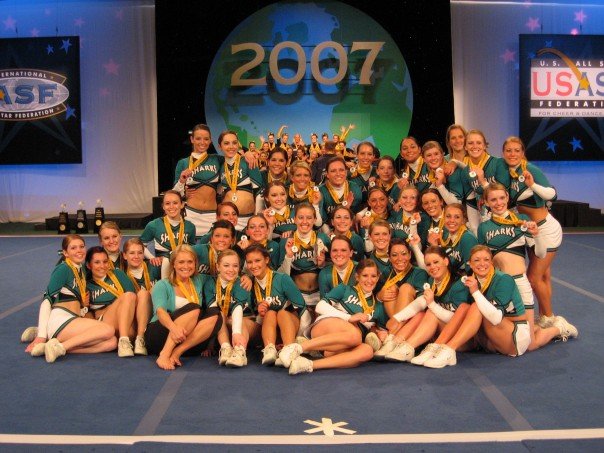
With the 2016 World’s Bronze medal win for the Great White Cheer Sport Sharks in Orlando Florida I was reunited with the thoughts and emotions of what it was like for me to be apart of such an amazing team. As a Great White Alumni myself I know the dedication, determination, and large hearts that each and every member of the shark family has.
Becoming and sustaining recognition on a world level requires athletes to push the limits. Reaching peak physical fitness is a challenging process that not only requires commitment and focus but also physical and mental sacrifice. Along with many other athletes my enjoyment of the sport was cut short due to physical injury. Now as a Naturopathic Medical Intern I have the ability to educate athletes on the importance of injury prevention. Adequate nutrition is a key component to health, physical fitness and optimal sports performance.
Hydration: First and foremost! This is the most important thing you can do for your body. Loss of even a small percent of body weight through sweating can adversely affect athletic performance. Symptoms of dehydration include fatigue, headaches and diminished mental acuity. Thirst is a late sign of inadequate hydration and warrants closer evaluation of the athletes daily water intake. To rehydrate water or electrolyte drinks are best but caution to avoid those with artificial ingredients, and high sugar contents. Caffeinated beverages are also not appropriate for rehydration as they have a diuretic effect worsening the issue.
Sleep: Sleepiness is an important risk factor for injury. Insufficient sleep not only deteriorates your physical performance but also attention, motivation, and ability to concentrate. This all contributes to increased risk of error and injury. Good-quality sleep is restorative, and an important element in injury prevention. Good sleep hygiene includes going to bed at consistent times, limiting screen time and ensuring your room is dark.
Magnesium & Zinc: Both magnesium and zinc are critical micronutrients in promoting strength and cardiorespiratory function in healthy persons and athletes. It is estimated that athletes involved in sports such was wrestling, gymnastics or diving consume less than 70% of recommended intakes of magnesium and zinc (Chen et al., 1989; Lukaski, 2000). Magnesium plays a fundamental role in many cellular reactions and is involved in numerous enzymatic reactions where foods are broken down and new products are formed. Data indicates that magnesium supplementation improves cardiorespiratory function during exercise (Lukaski 2001). Research also indicates that a zinc deficiency adversely affects skeletal muscle (Lukaski 2011). Zinc participates in enzymatic reactions such as carbonic anhydrase and lactate dehydrogenase which are involved in the metabolism during exercise.
Acupuncture: Competitive athletes, are faced with the challenge of pushing their minds and bodies to the limit. When athletes consistently work at higher and higher intensities, their performance becomes hindered due to the accumulation of lactic acid in the muscles. Acupuncture is an effective strategy to reduced lactic acid levels so athletes can complete at their best, and offers a faster, quicker recovery. Evidence from a 2011 study on elite basketball athletes showed acupuncture reduced HRmax, VO2max, and blood lactic acid levels in athletes at 30 and 60 minutes post exercise (Lin et al. 2011). The researchers conclude that these results suggest that acupuncture can enhance the recovery process after aggressive exercise (Lin et al. 2011). One possible explanation is that acupuncture increases circulation which promotes flushing of the lactic acid thereby reducing recovery times for athletes.
Positive self talk: It has been confirmed by research that you can talk yourself out of exhaustion. The effects of self-talk on endurance performance has been widely researched and evidence supports that reduced negative self talk enhances performance. By utilizing the mind/body connection through you can significantly improve your skills. It can also help them to become more focused, and even overcome or prevent training burnout (Knudstrup et al 2003).
Visualization: Intriguing research over a number of years had suggested the power of visualization. Results from a review of current research indicates that athletes who regularly use mental imagery have higher performance rates and lower perceived stress than the subjects who do not use mental imagery (Knudstrup et al, 2003). Besides having positive effects on performance, visualization also increases endurance, strength, aim, and precision in the sports and arts (Warner and McNeill, 1988). In order to participate in this practice choose a quiet, relaxed time to sit and visualize yourself going through your sport motions with precision exactly how you want to look on game/competition day.
References:
BLANCHFIELD, ANTHONY WILLIAM et al. “Talking Yourself Out Of Exhaustion”. Medicine & Science in Sports & Exercise 46.5 (2014): 998-1007. Web.
Chen, J.D., Wang, J.E, Li, K.J., Zhao, Y.W., Wang, S.W., Jiao, Y, and Hou, X.Y. (1989). Nutritional problems and measures in elite and amateur athletes. Am. J. Clin. Nutr. 49: 1084-1089.
Knudstrup, Mike, Sharon L. Segrest, and Amy E. Hurley. “The Use Of Mental Imagery In The Simulated Employment Interview Situation”. Journal of Managerial Psychology 18.6 (2003): 573-591. Web.
Lorist MM, Boksem MA, Ridderinkhof KR. Impaired cognitive control and reduced cingulate activity during mental fatigue. Brain Res Cogn Brain Res 2005;24:199–205.
Lin, Zen-Pin et al. “Effects Of Auricular Acupuncture On Heart Rate, Oxygen Consumption And Blood Lactic Acid For Elite Basketball Athletes”. The American Journal of Chinese Medicine 39.06 (2011): 1131-1138. Web.
Lukaski, Henry C. “Magnesium, Zinc, And Chromium Nutrition And Athletic Performance”. Canadian Journal of Applied Physiology 26.S1 (2001): S13-S22. Web.
Ker K, Edwards P, Roberts I, et al. Interventions for preventing injuries caused by impaired alertness in individuals who are sleep deprived (Protocol). Cochrane Database Syst Rev 2009;(2):CD007740.
Youngstedt, Shawn D. and Patrick J. O Connor. “The Influence Of Air Travel On Athletic Performance”. Sports Medicine 28.3 (1999): 197-207. Web.
Warner, L. and McNeill, M.E. (1988), “Mental imagery and its potential for physical therapy”, Physical Therapy, Vol. 68 No. 4, p. 516.
 By Breanne Kallonen
By Breanne Kallonen June 19, 2016
June 19, 2016